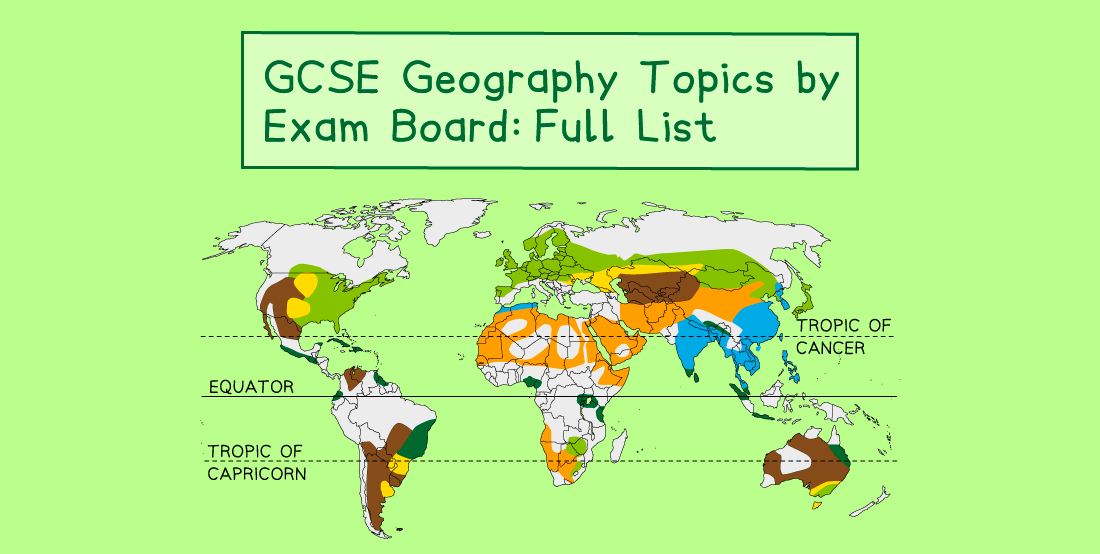Contents
GCSE geography is offered by a number of exam boards and differs from one school to another. The themes in geography can vary based on the exam board, but there is considerable overlap between topics. This can pose challenges for students and parents seeking specific subject information related to their exam board. This article provides an overview of the GCSE geography topics covered by the three leading exam boards: AQA, Edexcel, and OCR. This will ensure that you are fully aware of what you need to study for your exam.
AQA GCSE Geography Topics
The course is divided into four units:
Physical geography.
Human geography.
Decision-making and fieldwork.
Geographical skills.
1. Living with the physical environment.
This unit looks at natural processes and features in different environments. The unit considers the need for sustainable management plans that consider the direct and indirect consequences of humans on Earth and its atmosphere.
The unit is split into three sections, and each section covers various topics of the physical world.
Section A: The Challenge of Natural Hazards.
In this section, students study all these subtopics:
Section B: The Living World.
In this section, students are required to study:
One option from the following:
Section C: Physical Landscapes in the UK.
In this section, students are required to study:
Two options from the following:
2. Challenges in the human environment.
This unit looks at the elements that result in a wide range of human environments and how they evolve over time and space. It considers the need for sustainable management, along with current and future challenges and opportunities. Case studies are used to examine newly emerging economies (NEEs), lower income countries (LICs), and higher income countries (HICs).
The unit is split into three sections, and each section covers various topics of the human world.
Section A: Urban Issues and Challenges.
In this section, students study all these subtopics:
Section B: The Changing Economic World.
In this section, students study all these subtopics:
Section C: The Challenge of Resource Management.
In this section, students are required to study:
Food, water and energy are necessary for human development.
One option from the following:
3. Geographical applications.
Geographical application requires you to apply information, understanding, and skills from the entire course (what is called being synoptic). You will show your understanding and evaluate connections between many parts of the geography course.
The unit is split into two sections, and each section covers decision-making and fieldwork.
Core Section A:
Issues evaluation through pre-release material based on a theme from the core course.
Core Section B:
Two geographical enquiries, aka fieldwork—one human and one physical—that include the collection of primary data in two contrasting locations.
4. Geographical skills.
During your study, you must develop and show a variety of geographical skills, such as pictorial, cartographic, graphical, numerical, and statistical skills. All three exams will assess these skills.
What is Covered in AQA GCSE Geography Paper 1?
Units 1 and 4 are assessed.
Written exam 1 hour 30 minutes, worth 35% of total GCSE.
Section A: answer ALL questions (33 marks).
Section B: answer ALL questions (25 marks) (choose either hot or cold deserts).
Section C: answer two out of three options (coasts, rivers, glaciers).
What is Covered in AQA GCSE Geography Paper 2?
Units 2 and 4 are assessed.
Written exam 1 hour 30 minutes, worth 35% of total GCSE.
Section A: answer ALL questions (33 marks).
Section B: answer ALL questions (25 marks).
Section C: answer one of either food, energy or water management (25 marks).
What is Covered in AQA GCSE Geography Paper 3?
Written exam 1 hour, 15 minutes, worth 30% of total GCSE.
Section A: answer ALL questions (37 marks). Issue evaluation based on knowledge and understanding from core units 1 and 2 (with a pre-release), decision-making, and problem-solving.
Section B: answer ALL questions (39 marks) based on fieldwork skills, reflection on own fieldwork, and analysis of hypothetical fieldwork data.
Revision Resources for AQA GCSE Geography
At SaveMyExams, we’ve got revision notes, flashcards, topic questions and past papers on AQA GCSE Geography here:
Edexcel A GCSE Geography Topics
The course is divided into three components.
The physical environment.
The human environment.
Geographical investigations: fieldwork and UK challenges.
1. The physical environment.
This component looks at natural processes and features in different environments and how humans have impacted Earth and its atmosphere.
The component is split into three main topics, and each topic covers various aspects of the physical world.
Topic 1: The Changing Landscape of the UK.
In this section, students will study:
An overview of the UK's changing landscape.
Two options from:
Topic 2: Weather Hazards and Climate Change.
In this section, students will study:
An overview of the atmospheric global circulation and climate change over time.
Tropical cyclones and drought.
Topic 3: Ecosystems, Biodiversity and Management.
In this section, students will study:
2. The human environment.
This component brings together human geography and people-environment issues.
The component is split into three main topics, and each topic covers various aspects of human geography.
Topic 4: Changing Cities
In this section, students will study:
Topic 5: Global Development.
In this section, students will study:
Topic 6: Resource Management.
In this section, students will study:
Either energy resource management or water resource management at different scales.
3. Geographical investigations: fieldwork and UK challenges.
The unit is split into two sections, and each section covers decision-making and fieldwork.
Topic 7:
Two geographical investigations, aka fieldwork—one human and one physical—that include the collection of primary data in two contrasting locations.
Topic 8:
UK Challenges is where you apply information, understanding, and skills from the course (being synoptic) and investigate a contemporary challenge for the UK.
During your study, you must develop and show a variety of geographical skills, such as pictorial, cartographic, graphical, numerical, and statistical skills. All three exams will assess these skills.
What is Covered in Edexcel A GCSE Geography Paper 1?
Written exam 1 hour 30 minutes, worth 37.5% of total GCSE.
Three 30-mark sections with up to 4 marks for SPaG.
Section A: Answer Question 1 and choose two from the optional questions 2, 3, and 4.
Section B: Answer all questions on weather hazards and climate change.
Section C: Answer all questions on ecosystems, biodiversity and management.
The exam includes multiple-choice questions, short open, open response, calculations and 8-mark extended writing questions.
What is Covered in Edexcel A GCSE Geography Paper 2?
Written exam 1 hour 30 minutes, worth 37.5% of total GCSE.
Three 30-mark sections with up to 4 marks for SPaG.
Section A: Answer all questions on changing cities.
Section B: Answer all questions on global development.
Section C: Answer all questions on resource management.
The exam includes multiple-choice questions, short open, open response, calculations and 8-mark extended writing questions.
What is Covered in Edexcel A GCSE Geography Paper 3?
Written exam 1 hour 30 minutes, worth 25% of total GCSE.
Three 20-mark sections with up to 4 marks for SPaG.
Section A: Physical fieldwork: choose either rivers or coasts.
Section C: Answer all questions on UK challenges
The exam includes multiple-choice questions, short open, open response, calculations and 8-mark extended writing questions.
Revision Resources for Edexcel A GCSE Geography
At SaveMyExams, we’ve got great revision notes, flashcards, topic questions and past papers on Edexcel A GCSE Geography here:
OCR B GCSE Geography Topics
The course is divided into three components.
Our Natural World.
People and Society.
Geographical Exploration.
1. Our Natural World.
This component looks at developing an understanding of a variety of hazards that impact human lives, both within the UK and worldwide. You learn about nature and why it looks the way it does. You will also examine the many landscapes and ecosystems evolving due to physical and human forces.
The component is split into four main topics, and each topic covers various aspects of the physical world.
Topic 1: Global Hazards.
In this section, students will study:
Extreme weather: one UK-based and one non-UK-based natural weather hazard event.
Tectonics: example of a tectonic event and management.
Topic 2: Changing Climate.
In this section, students will study:
Natural and human-induced climate change.
Enhanced and natural greenhouse effect.
Topic 3: Distinctive Landscapes.
In this section, students will study:
Topic 4: Sustaining Ecosystems.
In this section, students will study:
2. People and Society.
This component examines how social, cultural, political, and economic influences shape places over time and space, particularly urbanisation and the challenges of feeding a growing population.
The component is split into four main topics, and each topic covers various aspects of human geography.
Topic 5: Urban Futures.
In this section, students will study:
Topic 6: Dynamic Development.
In this section, students will study:
Topic 7: UK in the 21st Century.
In this section, students will study:
Topic 8: Resource Reliance.
In this section, students will study:
3. Geographical Exploration.
There is no specific content for the decision-making exercise. However, this component draws on geographical information, understanding, and skills from Our Natural World and People and Society, which will be used in an unseen country’s specific problem/issue. This is a synoptic evaluation and you will link ideas from different topics to demonstrate how you ‘think like a geographer’.
During your study, you must develop and show a variety of geographical skills, such as fieldwork, pictorial, cartographic, graphical, numerical, and statistical skills. All three exams will assess these skills.
What is Covered in OCR B GCSE Geography Paper 1?
Written exam 1 hour 15 minutes, worth 35% of total GCSE.
Two sections, 70 marks with up to 3 marks for SPaG.
Section A: Answer all questions on individual topic areas.
Section B: Answer all questions on physical geography fieldwork.
What is Covered in OCR B GCSE Geography Paper 2?
Written exam 1 hour 15 minutes, worth 35% of total GCSE.
Two sections, 70 marks with up to 3 marks for SPaG.
Section A: Answer all questions on individual topic areas.
Section B: Answer all questions on human geography fieldwork.
What is Covered in OCR B GCSE Geography Paper 3?
Written exam 1 hour 30 minutes, worth 30% of total GCSE.
60 marks with up to 3 marks for SPaG.
Answer a decision-making exercise from a series of questions focusing on a synoptic range of topics from both components 1 and 2.
Revision Resources for OCR B GCSE Geography
At SaveMyExams, we’ve got great revision notes, topic questions, and past papers on OCR B GCSE Geography here:
2X Your Grades with Save My Exams
Here at Save My Exams, we develop high-quality, affordable revision resources that will help you study effectively and get the most out of your revision. Our revision resources are written by teachers and examiners. That means notes, questions by topic and worked solutions that show exactly what the examiners for each specific exam are looking for.
Explore our GCSE Geography resources to kickstart your journey to exam success.
References
AQA, 2024, GCSE - Geography, 8035: https://www.aqa.org.uk/subjects/geography/gcse/geography-8035/specification/specification-at-a-glance. Accessed 1 October 2024.
OCR, 2024 GCSE, Geography B (Geography for Enquiring Minds) (9-1) - J384: https://www.ocr.org.uk/qualifications/gcse/geography-b-geography-for-enquiring-minds-j384-from-2016/specification-at-a-glance/. Accessed 1 October 2024.
Pearson Edexcel. GCSE Geography A Specification Issue 4. Pearson Education Limited, 2024. Geography A (9-1) from 2016, https://qualifications.pearson.com/en/qualifications/edexcel-gcses/geography-a-2016.coursematerials.html#%2FfilterQuery=category:Pearson-UK:Category%2FSpecification-and-sample-assessments. Accessed 1 October 2024.
Here at Save My Exams, we develop high-quality, affordable revision resources; consider signing up for a Save My Exams subscription to help you get the most out of your revision. We support over 1.5 million students each month in preparing for their exams and achieving successful results; we’d love to help you too.
Sign up for articles sent directly to your inbox
Receive news, articles and guides directly from our team of experts.

Share this article


 written revision resources that improve your
written revision resources that improve your